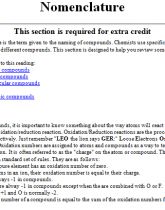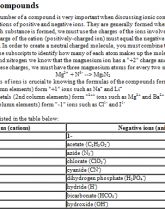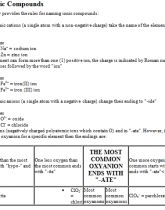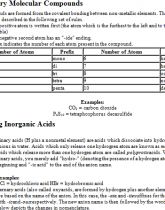Hledej
Zobraz:
Univerzity
Kategorie
Rozšířené vyhledávání
12 662
projektů
Nomenclature (Oxidation, Formic Ionic Compounds, Naming...)
| Přípona .doc |
Typ studijní materiál |
Stažené 0 x |
| Velikost 0,1 MB |
Jazyk anglický |
ID projektu 5007 |
| Poslední úprava 09.02.2015 |
Zobrazeno 1 568 x |
Autor: stefan.potocky |
 Sdílej na Facebooku
Sdílej na Facebooku |
||
| Detaily projektu | ||
- Cena:
1 Kreditů - kvalita:
84,9% -
Stáhni
- Přidej na srovnání
- Univerzita:Veterinární a farmaceutická univerzita Brno
- Fakulta:Farmaceutická fakulta
- Kategorie:Přírodní vědy » Chemie
- Předmět:Chemie přírodních látek
- Studijní obor:-
- Ročník:3. ročník
- Formát:MS Office Word (.doc)
- Rozsah A4:6 stran
This section is required for extra credit
Chemical nomenclature is the term given to the naming of compounds. Chemists use specific rules and "conventions" to name different compounds. This section is designed to help you review some of those rules and conventions.
There are five sections to this reading:
1. Forming ionic compounds
2. Naming ionic compounds
3. Naming molecular compounds
4. Naming acids
5. Naming organic compounds
Oxidation
When forming compounds, it is important to know something about the way atoms will react with each other. One important hint is the oxidation/reduction reaction. Oxidation/Reduction reactions are the processes of losing and gaining electrons respectively. Just remember "LEO the lion says GER:" Loose Electrons Oxidation, Gain Electrons Reduction. Oxidation numbers are assigned to atoms and compounds as a way to tell scientists where the electrons are in a reaction. It is often referred to as the "charge" on the atom or compound. The oxidation number is assigned according to a standard set of rules.
They are as follows:
1. An atom of a pure element has an oxidation number of zero.
2. For single atoms in an ion, their oxidation number is equal to their charge.
3. Fluorine is always -1 in compounds.
4. Cl, Br, and I are alway -1 in compounds except when the are combined with O or F.
5. H is normally +1 and O is normally -2.
6. The oxidation number of a compound is equal to the sum of the oxidation numbers for each atom in the compound.
Chemical nomenclature is the term given to the naming of compounds. Chemists use specific rules and "conventions" to name different compounds. This section is designed to help you review some of those rules and conventions.
There are five sections to this reading:
1. Forming ionic compounds
2. Naming ionic compounds
3. Naming molecular compounds
4. Naming acids
5. Naming organic compounds
Oxidation
When forming compounds, it is important to know something about the way atoms will react with each other. One important hint is the oxidation/reduction reaction. Oxidation/Reduction reactions are the processes of losing and gaining electrons respectively. Just remember "LEO the lion says GER:" Loose Electrons Oxidation, Gain Electrons Reduction. Oxidation numbers are assigned to atoms and compounds as a way to tell scientists where the electrons are in a reaction. It is often referred to as the "charge" on the atom or compound. The oxidation number is assigned according to a standard set of rules.
They are as follows:
1. An atom of a pure element has an oxidation number of zero.
2. For single atoms in an ion, their oxidation number is equal to their charge.
3. Fluorine is always -1 in compounds.
4. Cl, Br, and I are alway -1 in compounds except when the are combined with O or F.
5. H is normally +1 and O is normally -2.
6. The oxidation number of a compound is equal to the sum of the oxidation numbers for each atom in the compound.
Klíčová slova:
Section
Oxidation
Ionic
Compounds
Electrons
Reduction
Caions
Anions
Ammonium
Hydrogen
Silver
Acetate
Cyanide
Hydroxide
Arrangemen
Atoms
Obsah:
- 1. Nomenclature
2. Oxidation
3. Forming Ionic compounds
4. Naming Ionic compounds
5. Arrangement of atoms
6. Naming binary molecular compounds
7. Naming inorganic acids
8. Naming organic compounds
9. Practice problems



